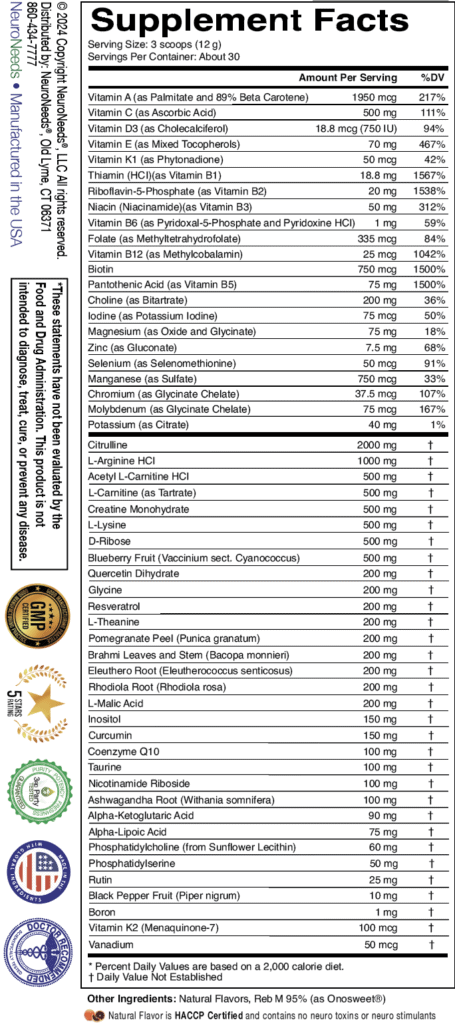$84
Vanadium
Vanadium is a trace mineral found in the diet and present in humans. It is required in the diet of many animal species. Vanadium likely is needed for bone growth in humans, but studies are few and inconclusive. At present, vanadium is not recommended for any disease or condition. However, it may have an effect on blood sugar in people with prediabetes or diabetes, and is often supplemented in this context. High doses of vanadium (> 1,800 mcg) may have side effects. Discuss with your physician if on medications for diabetes or blood clotting, as vanadium may potentiate the effects of medications leading to hypoglycemia or bleeding. Side effects are unexpected at the low dose used in ActivNeeds (50 mcg).
Vanadium in ActivNeeds
Vanadium is present in order to provide a wide basis of nutrition, especially given the important role of vanadium in bone and sugar control. Vanadium is sometimes advertised as a sports supplement, and there may be benefits although there is no evidence thereof.
Vanadium is a trace mineral that is present in many foods and drinking water. In particular, it is found in mushrooms, shellfish, black pepper, parsley, grains, and beer.
Vanadium has not been proven to be an essential mineral for humans, although it is present in the body. Vanadium has been proven to be a dietary requirement in many animal species, including effects on bone growth. Research suggests that vanadium is needed by humans in very small amounts for normal bone growth, however, it is unclear what amount might be helpful. Vanadium appears to increase the effects of insulin.
It is not known how vanadium deficiency manifests in humans. However, growth retardation, bone deformities, infertility and increased infant mortality have been reported with vanadium deficiency in animals. Few clinical trials in humans have been performed.
At present, vanadium is not recommended for any disease or condition. However, it may have an effect on blood sugar in people with prediabetes or diabetes, and is often supplemented in this context. Vanadium is sometimes advertised as a sports supplement, but there is no evidence of any benefits.
An average diet provides 6 to 18 mcg vanadium daily, and it is considered to be safe when used in amounts less than 1.8 mg (1,800 mcg) daily. Many supplements available online contain 2-7.5 mg (2,000-17,000 mcg) of vanadium. High doses might result in nausea, diarrhea, or conditions related to nerves or kidney. Taking vanadium and diabetes medications might result in hypoglycemia (low blood sugar). Vanadium might slow blood clotting, and thus vanadium and medications that also slow blood clotting might increase the risk of bleeding. Side effects are unlikely in the dosing present in ActivNeeds® (50 mcg = 0.50 mg).
Laboratory testing can test for vanadium, but is generally not likely to have clinically utility.
How and Why Vanadium Is Used in ActivNeeds
Vanadium is added to ActivNeeds in order to provide a wide basis of nutrition, especially given the important role of vanadium in bone and sugar control. Vanadium is sometimes advertised as a sports supplement, and there may be benefits although there is no evidence thereof. Side effects are unexpected at the low dose used in ActivNeeds (50 mcg).
Order ActivNeeds Today
Formulations










